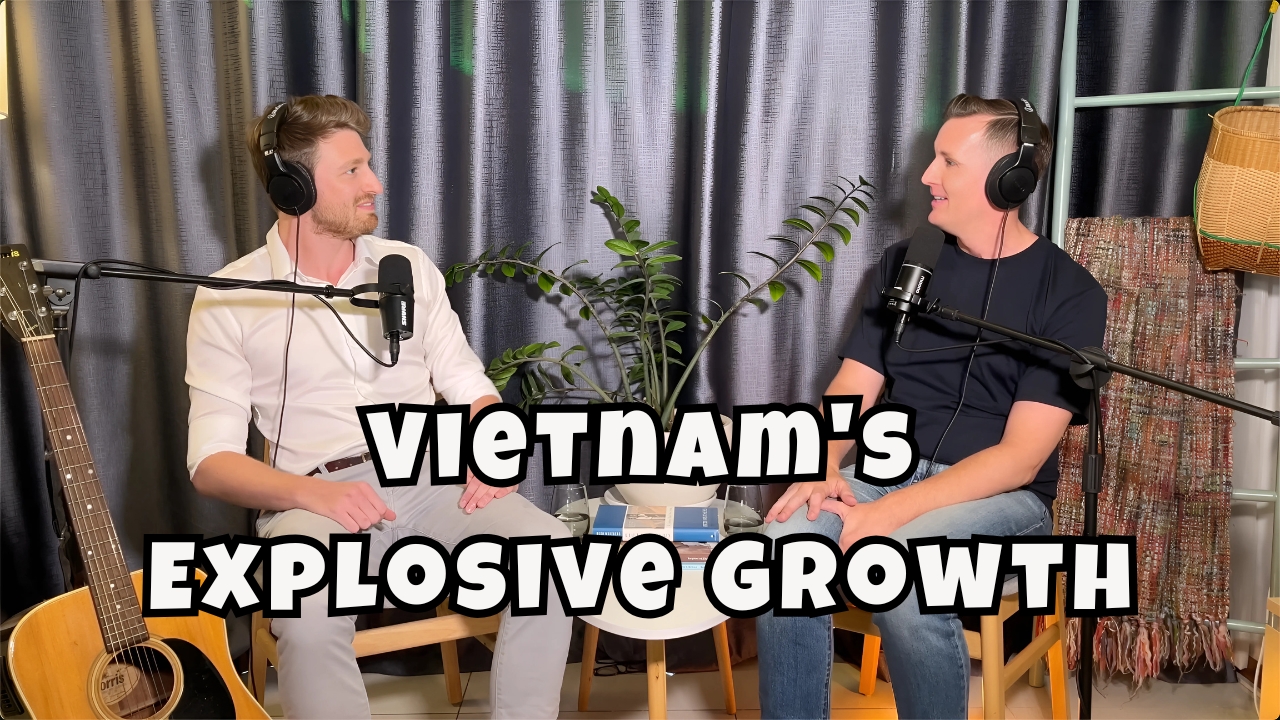My name is Niall Mackay, the Podcast Guy. I founded Seven Million Bikes Podcasts and host this show, A Vietnam Podcast, to spread my passion for storytelling and Vietnamese stories.
When I first moved to Vietnam, I had no idea how long I’d stay. I think that’s true for a lot of us. We come for a year, maybe two, and suddenly it’s been five, seven, even ten years. My guest on this episode, Hugo Bosch, is a perfect example of that.
Hugo Bosch, a long-term expat who’s been living and working in Vietnam for over seven years. Hugo is a financial analyst at Ho Chi Minh City Securities Corporation (HSC), one of the country’s top stock brokerages.
Let’s figure out why Vietnam’s economy is booming, how to invest in its stock market, and what it’s really like living (and rowing) in Saigon.
From One Year to Seven: Why Expats Stay in Vietnam
When people overseas hear “Vietnam,” they often jump to war, poverty, or rural life. I recently posted about the podcast in a group, and someone assumed it was about military veterans. It’s a frustrating but common reaction. The truth is, Vietnam has moved far beyond those old narratives—and conversations like this one with Hugo help show just how much.
This is a country with one of the fastest-growing economies in the world. A young, ambitious population. A stock market worth hundreds of billions. A city where cafés, electric bikes, and financial opportunity are around every corner. Yes, the air pollution can be rough. Yes, there are still challenges. But there’s also incredible momentum, and it’s exciting to be part of it.
Hugo originally came to Vietnam planning to stay for just one year. Like many people, he wanted the experience of living and working in a new country. But, as he said in our chat, one year quickly turned into two—and next thing he knew, it was 2025 and he was still here.
What kept him here? The lifestyle, the energy of the city, and surprisingly, riding a motorbike.
Hugo told me that one of the reasons he decided to stay was simply because he could ride a motorbike every day. And I totally get that. It might sound like a small thing, but if you’ve ever driven through Saigon traffic, weaving through the streets with a warm breeze in your face, you’ll understand the freedom it gives you. Back home, riding a motorbike might be dangerous or just not practical. But here, it’s a way of life.
Why is Vietnam fascinating?
Hugo shared that at the end of his first year, he actually sat down and wrote a pros and cons list. On one side, the things he’d miss if he went back home. On the other side, the reasons to stay. And the “pros” list was much longer. That moment made him realise he wanted to build a life here.
This really made me think. Most expats I know didn’t plan to live here long-term. They came for work, travel, or something new. But Vietnam has a way of pulling you in. It’s the people, the food, the chaos that somehow works, the feeling that things are growing and changing fast, and that you can grow with it.
I’ve had a similar experience. I didn’t plan to live in Saigon for this long either. But over time, the city becomes home. You find your routines, your places, your people. And one day, you look around and realise—you’re not just passing through anymore. You live here.
Understanding Vietnam’s Capital Markets
I’ll be honest—before talking to Hugo, I didn’t really understand what capital markets meant. I’d heard the term, but it felt like one of those vague finance buzzwords you hear in movies. Stocks, bonds, trading floors… not exactly my world. But Hugo broke it down in a way that made it finally click.
At HSC, Hugo works on the research desk, which means he helps write detailed reports about Vietnamese companies. These reports look at everything from how the company is performing to what the future might look like for their stock. His team’s job is to help investors (big and small) make smart decisions based on data, trends, and company fundamentals.
What really surprised me was just how active and well-structured Vietnam’s stock market actually is. The country has three main exchanges:
- HOSE (Ho Chi Minh Stock Exchange) – the biggest one.
- HNX (Hanoi Stock Exchange).
- UPCoM (Unlisted Public Company Market) – also based in Hanoi.
The numbers are impressive too. On HOSE alone, the average daily trading value is about $732 million USD. There are over 500 companies listed, and the total market capitalization is around $288 billion USD. Compare that to the UK’s $3.2 trillion or the US’s $50 trillion, and Vietnam still seems small—but it’s growing fast.
And that’s the thing—most foreigners don’t even realize this side of Vietnam exists. We often think of Vietnam as cheap street food, motorbikes, or tropical travel spots. But underneath that surface is a modernizing, fast-paced financial world that’s attracting major international interest.
Why Vietnam’s Economy Is Growing So Fast
Vietnam’s economy has quietly become one of the most impressive growth stories in the world. Over the past 30 years, the country has averaged 6.6% GDP growth per year—a rate that most Western economies could only dream of.
- Young, dynamic population:
Hugo explained that one of the biggest reasons behind this growth is Vietnam’s demographic advantage. With a population of around 101 million, a staggering 70% are under the age of 35. That creates a young, motivated, and dynamic workforce eager to move into cities, try new things, and push the economy forward.
- Urbanization is still in progress:
And here’s the thing—only 40% of Vietnam’s population lives in urban areas. That means there’s still massive room for growth as more people move from the countryside to the cities.
- Export-driven economy
The urbanization process provides a steady stream of labor for export-driven industries like textiles, electronics, and manufacturing.
- Foreign direct investment (FDI)
Foreign companies are pouring investment into Vietnam and are attracted by the low labor costs and high productivity. All of this leads to an economy that’s not just growing, but thriving.
Investing in Vietnam: Challenges and Opportunities
One of the biggest barriers to investing in Vietnam, as Hugo pointed out, is trust. For many foreigners, the idea of putting money into a developing market—especially one they know little about—can feel risky. But what surprised me is how solid the system actually is.
To invest, you simply need to set up a custodian bank account (like with BIDV), and then open a brokerage account. Hugo assured me that in his years of working in the market, he’s never had any issues with the process itself. The structure is reliable—it’s just not widely known.
Rowing on the Saigon River: The Strangest Surprise
One of the most unexpected parts of this episode? Learning that Hugo rows on the Saigon River—every week.
He and a small group of five take their boats out from an islet near Thao Dien and row around the island. But this isn’t some peaceful glide on calm water. The river is tidal, constantly shifting direction. Add in fishing boats, barges, and massive floating mats of water hyacinth, and it becomes a serious challenge.
At one point, a rower got so tangled in the weeds he had to jump out, swim into the mess, and lift his boat free. Hugo joked that some of these floating clumps are so large, “they deserve their own UN representation.”
But here’s the real twist: Hugo said the Thames—yes, the iconic river in London—is dirtier. After rowing there, he’d come home smelling awful. In Saigon? Not so much. There might be the occasional river whiff, but it’s not nearly as bad as you’d think.
Final Thoughts
If you enjoyed this episode, I’d love it if you shared it with someone else—whether they’re thinking of visiting Vietnam, investing here, or just curious about life on this side of the world. And definitely check out Hugo’s own show, Emerging Vietnam, for more insights on where this country is heading next.

